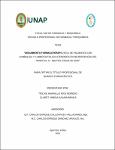| dc.contributor.advisor | Calloapaza Valladares, Carlos Enrique | |
| dc.contributor.advisor | Sánchez Araujo, Carlos Enrique | |
| dc.contributor.author | Rios Moreno, Tricxie Amarillis | |
| dc.contributor.author | Sajami Braga, Claret Ximena | |
| dc.date.accessioned | 2021-05-21T13:23:00Z | |
| dc.date.available | 2021-05-21T13:23:00Z | |
| dc.date.issued | 2021 | |
| dc.identifier.uri | https://hdl.handle.net/20.500.12737/7250 | |
| dc.description.abstract | Todas las personas padecen diversas patologías crónicas a lo largo de su vida por lo que están expuestos a polifarmacia y, por tanto, a problemas relacionados con medicamentos (PRM). El objetivo de este trabajo fue evaluar el seguimiento farmacoterapéutico (SFT) aplicado a pacientes con lumbalgia y lumbociatalgia atendidos en neurocirugía del Hospital III - Iquitos, EsSalud 2020. Así mismo, identificar los problemas relacionados con los medicamentos (PRM) con la finalidad de mejorarlos. Empleándose como metodología el estudio descriptivo, prospectivo, analítico y de tipo transversal durante un periodo de seis meses, realizado la evaluación en una población de 52 pacientes para cada manifestación clínica, a los cuales se les revisó la historia clínica, se entrevistó y analizó las fichas de SFT utilizando como herramienta la metodología DADER. Obteniéndose como resultados que el seguimiento farmacoterapéutico aplicado, permitió detectar adherencia al tratamiento con un 57,7% para pacientes con lumbalgia y 63,5% para pacientes con lumbociatalgia, la mayoría de pacientes presentan PRM 6 en la categoría de seguridad con 80,8% y 63,5% respectivamente de cada manifestación clínica, con una disminución del dolor moderado después del SFT con un 67,3% en lumbalgia y 78,8% en lumbociatalgia. El seguimiento farmacoterapéutico reduce la intensidad de dolor en pacientes con lumbalgia y lumbociatalgia, identifica los problemas relacionados a los medicamentos y mejora la adherencia al tratamiento farmacológico. | es_PE |
| dc.description.abstract | All people suffer from various chronic pathologies throughout their lives, which is why they are exposed to polypharmacy and, therefore, to drug-related problems (PRM). The objective of this work was to evaluate the Pharmacotherapeutic Follow-up (SFT) applied to patients with low back pain and lumbociatalgia treated in neurosurgery at Hospital III - Iquitos, EsSalud 2020. Likewise, identify drug-related problems (DRP) in order to improve them. Using as methodology the descriptive, prospective, analytical and cross-sectional study during a period of six months, carried out the evaluation in a population of 52 patients for each clinical manifestation, whose clinical history was reviewed, interviewed and analyzed SFT files using the DADER methodology as a tool. Obtaining the results that the applied pharmacotherapeutic follow-up allowed the detection of adherence to treatment with 57.7% for patients with low back pain and 63.5% for patients with low back pain, the majority of patients present PRM 6 in the safety category with 80.8% and 63.5% respectively of each clinical manifestation, with a decrease in moderate pain after SFT with 67.3% in low back pain and 78.8% in low back pain. Pharmacotherapeutic follow-up reduces the intensity of pain in patients with low back pain and low back pain, identifies drug-related problems, and improves adherence to drug treatment.
Keywords: pharmacotherapeutic monitoring, medication related problem, adherence to pharmacological treatment, and analogous assessment of pain. | en_US |
| dc.format | application/pdf | es_PE |
| dc.language.iso | spa | es_PE |
| dc.publisher | Universidad Nacional de la Amazonía Peruana | es_PE |
| dc.rights | info:eu-repo/semantics/openAccess | es_PE |
| dc.rights.uri | https://creativecommons.org/licenses/by/4.0/ | es_PE |
| dc.subject | Farmacoterapia | es_PE |
| dc.subject | Lumbalgia | es_PE |
| dc.subject | Cuidado de seguimiento | es_PE |
| dc.subject | Neuralgia ciática | es_PE |
| dc.title | Seguimiento farmacoterapéutico de pacientes con lumbalgia y lumbociatalgia atendidos en neurocirugía del Hospital III - Iquitos, EsSalud 2020 | es_PE |
| dc.type | info:eu-repo/semantics/bachelorThesis | es_PE |
| thesis.degree.discipline | Farmacia y Bioquímica | es_PE |
| thesis.degree.grantor | Universidad Nacional de la Amazonía Peruana. Facultad de Farmacia y Bioquímica | es_PE |
| thesis.degree.name | Quimico(a) Farmacéutico(a) | es_PE |
| dc.subject.ocde | http://purl.org/pe-repo/ocde/ford#3.01.05 | es_PE |
| renati.author.dni | 72690372 | |
| renati.author.dni | 72853229 | |
| renati.advisor.orcid | https://orcid.org/0000-0002-2996-938X | es_PE |
| renati.advisor.orcid | https://orcid.org/0000-0002-2035-6763 | es_PE |
| renati.advisor.dni | 29371419 | |
| renati.advisor.dni | 16647803 | |
| renati.type | http://purl.org/pe-repo/renati/type#tesis | es_PE |
| renati.discipline | 917046 | es_PE |
| renati.level | http://purl.org/pe-repo/renati/level#tituloProfesional | es_PE |
| renati.juror | Núñez Román, Andrés Oberti | |
| renati.juror | Alvarez Marreros, Roy Alexander | |
| renati.juror | Gonzales Díaz de Mora, Jacqueline Margot | |
| dc.publisher.country | PE | es_PE |


